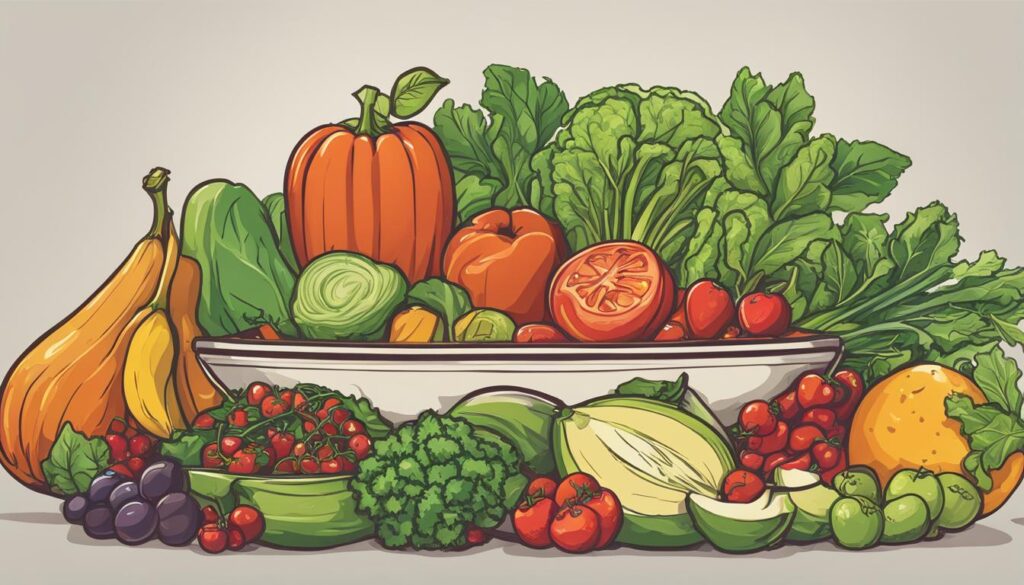
The kidney is a vital organ responsible for filtering blood, removing waste products, and maintaining fluid balance in the body. It plays a crucial role in maintaining overall health and well-being. Understanding how the kidneys function and ways to keep them healthy is essential. In this guide, we will explore the functions of the kidneys, the risks and causes of kidney disease, tips for maintaining kidney health, and the importance of a kidney-friendly diet. We will also discuss common issues such as kidney stones and provide information on kidney disease prevention.
Key Takeaways:
- The kidneys are responsible for filtering blood, removing waste products, and maintaining fluid balance in the body.
- Kidney disease is a common condition that can lead to serious complications if not detected and managed early.
- Maintaining a kidney-friendly diet, staying hydrated, and exercising regularly are key factors in maintaining kidney health.
- Regular check-ups and screenings can help detect any signs of kidney damage and prevent further complications.
- Managing underlying conditions such as diabetes and high blood pressure is crucial for kidney disease prevention.
How Your Kidneys Work and Why They Are Important
The kidneys, two bean-shaped organs located near the middle of the back, play a crucial role in maintaining overall health and well-being. Their primary function is to filter the blood, removing waste products and excess fluid from the body. This process, known as blood filtration, ensures that the bloodstream remains clean and free from toxins.
In addition to blood filtration, the kidneys are responsible for waste removal. They eliminate substances such as urea and ammonia that are produced as byproducts of normal cellular function. By efficiently eliminating these waste products, the kidneys help maintain the body’s chemical balance.
Another vital function of the kidneys is maintaining fluid balance. They regulate the amount of water and electrolytes in the body, ensuring that the levels are within a healthy range. This process is essential for proper hydration, blood volume control, and prevention of conditions like dehydration or fluid overload.
In summary, the kidneys are essential organs that perform critical functions such as blood filtration, waste removal, and fluid balance. Their health and proper functioning are crucial for overall well-being and should be prioritized through a conscious effort to maintain renal health.

Table: Comparison of Kidney Functions
| Kidney Functions | Description |
|---|---|
| Blood Filtration | The kidneys filter the blood, removing waste products and excess fluid. |
| Waste Removal | The kidneys eliminate waste substances produced by the body’s metabolic processes. |
| Fluid Balance | The kidneys regulate water and electrolyte levels to maintain proper hydration and blood volume. |
Common Kidney Issues and Risk Factors
Kidney disease and kidney stones are two common kidney issues that can significantly impact an individual’s health. Understanding the risk factors associated with these conditions is crucial for early detection and prevention.
Risk Factors of Kidney Disease
Kidney disease can be caused by various factors, including:
- Diabetes: High blood sugar levels can damage the kidneys over time.
- High blood pressure: Uncontrolled hypertension can lead to kidney damage.
- Family history: Genetics can play a role in the development of kidney disease.
- Age: The risk of kidney disease increases with age.
- Smoking: Tobacco use can contribute to kidney damage.
Other risk factors include obesity, cardiovascular disease, and certain medications.
Risk Factors of Kidney Stones
Kidney stones are hard deposits that form in the kidneys and can cause severe pain and discomfort. Risk factors for kidney stones include:
- Dehydration: Insufficient fluid intake can lead to the formation of kidney stones.
- Family history: Individuals with a family history of kidney stones are at a higher risk.
- Diet: High intake of sodium, oxalate, and animal protein can contribute to the formation of kidney stones.
- Obesity: Excess weight can increase the likelihood of developing kidney stones.
- Certain medical conditions: Conditions such as hyperparathyroidism and urinary tract infections can increase the risk.
By understanding these risk factors, individuals can take proactive measures to reduce their risk of kidney disease and kidney stone formation, promoting better overall renal health.

Create an image of a kidney with jagged, rough edges surrounded by small, scattered pebbles. The stones should be various shades of brown and gray, and they should appear to be obstructing the flow of urine. The background should be dark and foreboding, with shadows cast over the kidney as if it is in pain.
Table: Risk Factors Comparison
| Risk Factors | Kidney Disease | Kidney Stones |
|---|---|---|
| Diabetes | ✓ | – |
| High blood pressure | ✓ | – |
| Family history | ✓ | ✓ |
| Age | ✓ | – |
| Smoking | ✓ | – |
| Obesity | ✓ | ✓ |
| High sodium intake | – | ✓ |
| High oxalate intake | – | ✓ |
| High animal protein intake | – | ✓ |
| Dehydration | – | ✓ |
By identifying and addressing these risk factors, individuals can take proactive steps to protect their kidney health and reduce the likelihood of developing kidney disease or kidney stones.
Tips for Maintaining Kidney Health
When it comes to maintaining kidney health, adopting healthy lifestyle habits is essential. Here are some tips to help you keep your kidneys in optimal condition:
- Follow a kidney-friendly diet: A kidney-friendly diet includes foods that support kidney health and minimize the risk of complications. Focus on consuming whole grains, nuts, fruits, and vegetables. These foods are rich in essential nutrients and low in sodium, which is important for maintaining proper kidney function.
- Stay hydrated: Drinking an adequate amount of water throughout the day is crucial for kidney health. It helps flush out toxins and waste products from the body. Aim to drink at least eight glasses of water daily, or more if you are physically active or in a hot climate.
- Engage in regular exercise: Regular physical activity has numerous benefits for overall health, including kidney health. Exercise helps control blood pressure, manage weight, and improve circulation, all of which contribute to optimal kidney function.
- Control blood pressure: High blood pressure is one of the leading causes of kidney disease. Take steps to monitor and control your blood pressure, such as following a low-sodium diet, exercising regularly, and taking prescribed medications as directed by your healthcare provider.
By incorporating these tips into your daily life, you can significantly reduce the risk of kidney disease and promote better renal health. Remember to consult with your healthcare provider for personalized advice and guidance based on your specific health needs.

Kidney Disease Prevention
Preventing kidney disease is crucial for maintaining optimal renal health. Regular check-ups and screenings play a vital role in early detection and intervention. By taking proactive measures and managing underlying conditions, individuals can significantly reduce their risk of developing kidney disease.
In order to monitor kidney function and detect any abnormalities, blood and urine tests are essential. These tests can provide valuable insights into kidney health and help identify any signs of kidney damage or dysfunction. Regular check-ups with a healthcare professional can ensure timely detection and intervention if needed.
Managing underlying conditions such as diabetes and high blood pressure is vital for kidney disease prevention. These conditions are leading causes of kidney damage and can significantly increase the risk of developing kidney disease. By effectively managing these conditions through medication, lifestyle changes, and regular monitoring, individuals can reduce the strain on their kidneys and prevent long-term damage.
Adopting a healthy lifestyle is also crucial for kidney disease prevention. This includes following a balanced and kidney-friendly diet, staying physically active, maintaining a healthy weight, avoiding smoking, and limiting alcohol consumption. These lifestyle choices can help maintain overall health and reduce the risk of kidney disease.
Tips for Kidney Disease Prevention:
- Attend regular check-ups and screenings to monitor kidney function
- Undergo blood and urine tests to detect signs of kidney damage
- Manage underlying conditions such as diabetes and high blood pressure
- Follow a balanced and kidney-friendly diet
- Engage in regular physical activity and maintain a healthy weight
- Avoid smoking and limit alcohol consumption
By adhering to these tips and incorporating healthy habits into daily life, individuals can take proactive steps towards preventing kidney disease and promoting long-term renal health.

Conclusion
Understanding the importance of kidney health and taking steps to prevent kidney disease is crucial for overall well-being. By prioritizing renal health, individuals can protect the long-term functioning of this vital organ.
One of the key factors in maintaining kidney health is adopting a kidney-friendly diet. This includes consuming whole grains, nuts, fruits, and vegetables while limiting the intake of sodium and processed foods. Staying hydrated and exercising regularly also contribute to kidney health.
Regular check-ups and screenings are essential for early detection and intervention if needed. By monitoring blood and urine tests, any signs of kidney damage can be identified, allowing for timely intervention and treatment. Managing underlying conditions, such as diabetes and high blood pressure, is also crucial in preventing kidney disease.
By following these preventive measures and incorporating healthy lifestyle habits, individuals can reduce their risk of kidney disease and promote better renal health. Prioritizing kidney health is an investment in long-term well-being and can lead to a healthier and happier life.
FAQ
What are the functions of the kidneys?
The kidneys are responsible for filtering blood, removing waste products, maintaining fluid balance, regulating blood pressure, and keeping the bones healthy.
What is kidney disease?
Kidney disease occurs when the kidneys are permanently damaged and can no longer function properly, leading to the accumulation of extra fluid and waste in the bloodstream.
How common are kidney stones?
Kidney stones are a common problem and can cause severe pain and discomfort.
How can I maintain kidney health?
Maintaining kidney health involves following a kidney-friendly diet, staying hydrated, exercising regularly, and controlling blood pressure.
How can I prevent kidney disease?
Prevention of kidney disease involves regular check-ups and screenings, managing underlying conditions like diabetes and high blood pressure, and adopting a healthy lifestyle.
How do the kidneys contribute to urinary health?
The kidneys play a crucial role in maintaining the balance of electrolytes, regulating blood pressure, and producing hormones that help with red blood cell production and bone health.
What is chronic kidney disease?
Chronic kidney disease (CKD) is a long-term condition where the kidneys gradually lose function over time, leading to a buildup of waste and fluid in the body.
What are the parts of the urinary system?
The urinary system consists of the kidneys, ureters, bladder, and urethra, working together to eliminate waste and maintain bodily fluid balance.
How are the kidneys structured?
The kidneys are two bean-shaped organs located on either side of the spine. Each kidney contains a million nephrons, which are responsible for filtering the blood.
What are common kidney problems?
Kidney problems can include kidney infections, kidney stones, kidney cysts, and conditions like diabetes and polycystic kidney disease that can cause kidney damage.
How can I keep my kidneys healthy?
To maintain healthy kidneys, it’s important to stay hydrated, eat a balanced diet, avoid excessive salt intake, manage blood pressure, and refrain from smoking.
What contributes to kidney pain?
Kidney pain can occur due to kidney stones, urinary tract infections, or conditions affecting the kidneys such as polycystic kidney disease or kidney infections.
What is the role of the renal arteries and veins in kidney function?
The renal arteries deliver oxygenated blood to the kidneys, while the renal veins carry filtered and oxygen-depleted blood away from the kidneys.
What are common symptoms of kidney failure?
Symptoms of kidney failure can include fatigue, swelling in the legs and feet, decreased urine output, difficulty sleeping, and changes in appetite.






